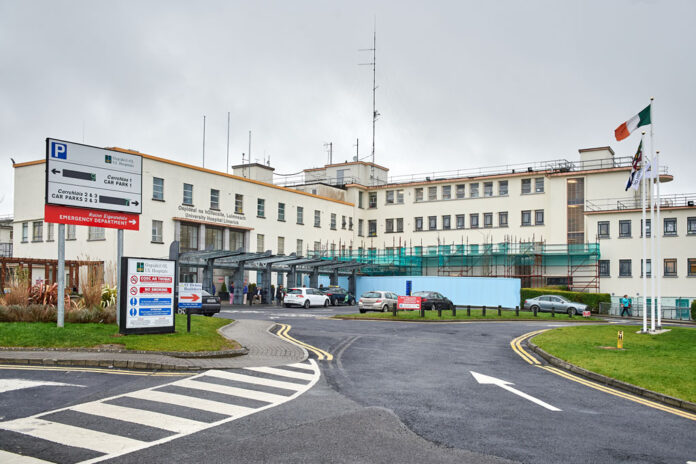A PLANNED debate about overcrowding at University Hospital Limerick was deferred at a meeting on Tuesday when there were 84 patients on trolleys in the hospital, a number that rose to 100 this Wednesday.
Councillor Liam Grant and Councillor Seamus Morris had tabled a motion calling for the consistent overcrowding to be addressed by reversing the closure of Emergency Departments at Ennis, Nenagh and St John’s Hospital at a HSE West Forum meeting on Tuesday.
However, the councillors decided to defer any discussion on this motion due to the lack of any representative from the UL Hospitals’ Group at the meeting.
Overcrowding continues to be a problem at the regional flagship acute hospital where the number of patients on trolleys soared to 100 on Wednesday.
According to the Irish Nurses and Midwives’ Organisation Trolley Watch, this was almost twice the number of patients on trolleys in Letterkenny where were were 54 patients on trolleys and was also much higher than Cork University Hospital’s total of 50.
There were 89 confirmed Covid-19 cases and 15 suspected cases of the virus being treated in UHL on Tuesday. In fact, the number of confirmed Covid-19 patients in UHL was the third highest in the country after the Mater Hospital, which had 103 and Beaumont, which had 99.
In a statement issued to the Clare Champion, the Mid-West Hospital Campaign group expressed their disappointment on the news that their motion, calling for action to address the serious overcrowding at UHL, had to be deferred “due to the absence of the group’s CEO” from the Regional Health Forum on Tuesday.
“Tipperary Councillor Seamus Morris who was due to table the motion on behalf of the group did contact the forum in advance of the meeting to confirm Colette Cowan’s attendance but only learned when the meeting had begun that the story had changed and she was not now going to be present.
“The motion will be brought again before the next meeting of the HSE West Regional Health Forum.”
A spokesperson for the Mid-West Hospital Campaign group said this issue is too important to ignore and it deserves a hearing and to be properly addressed.
“We are disappointed but we wont be giving up on this. We hope that Ms Cowan will make herself available to be present at the next meeting,” she added.
Speaking to the Clare Champion, Councillor Morris said he was informed by the HSE on Monday that Colette Cowan would be in attendance but as he entered the forum meeting on Tuesday was told that she wasn’t in a position to attend.
Saolta University Health Care Group chief executive officer, Tony Canavan told the forum meeting that Ms Cowan took her responsibilities to this health authority seriously.
Responding to Clare Champion queries, a spokesman for the UL Hospitals’ Group said the group regretted that no member of the executive management team was available to attend this Tuesday’s meeting of the HSE West Regional Health Forum.
“A number of members of the team are currently symptomatic and, in line with public health guidance, were unable to attend. We will make every effort to attend the next meeting of the forum,” he said.
The Mid-West Hospital Campaign has consistently argued that Ennis, Nenagh and St John’s Hospitals should not have been downgraded when 24-hour casualty cover was removed in April 2009.
The group has claimed that a new centre of excellence was promised at University Hospital Limerick but what patients got instead was the country’s most consistently overcrowded emergency department.
Meanwhile, visiting restrictions on inpatient wards in UHL were put in place on Sunday, March 20. This was due to very high levels of Covid-19 positive patients in the hospital and the high level of community transmission.
The group said it regretted the imposition of visiting restrictions so soon after managers began to lift them. The decision has been taken to help keep all patients and staff safe, and to ensure that the hospital’s essential services can remain open at this time.
The only exceptions are parents visiting children in hospital, people assisting confused patients; for example, dementia and visiting on compassionate grounds for patients who are critically unwell or at end of life.
Exemptions are limited to one person per patient and will be looked at on a case by case basis.
In cases where exemptions apply, the group strongly recommend that patients are fully vaccinated against Covid-19 before coming to the hospital, to minimise risks to the patient, hospital patients and staff.
The group advises also that people should not visit relatives or loved ones outdoors in the grounds of the hospital, as this can also present a Covid-19 transmission risk.
East Clare correspondent, Dan Danaher is a journalism graduate of Rathmines and UL. He has won numerous awards for special investigations on health, justice, environment, and reports on news, agriculture, disability, mental health and community.


